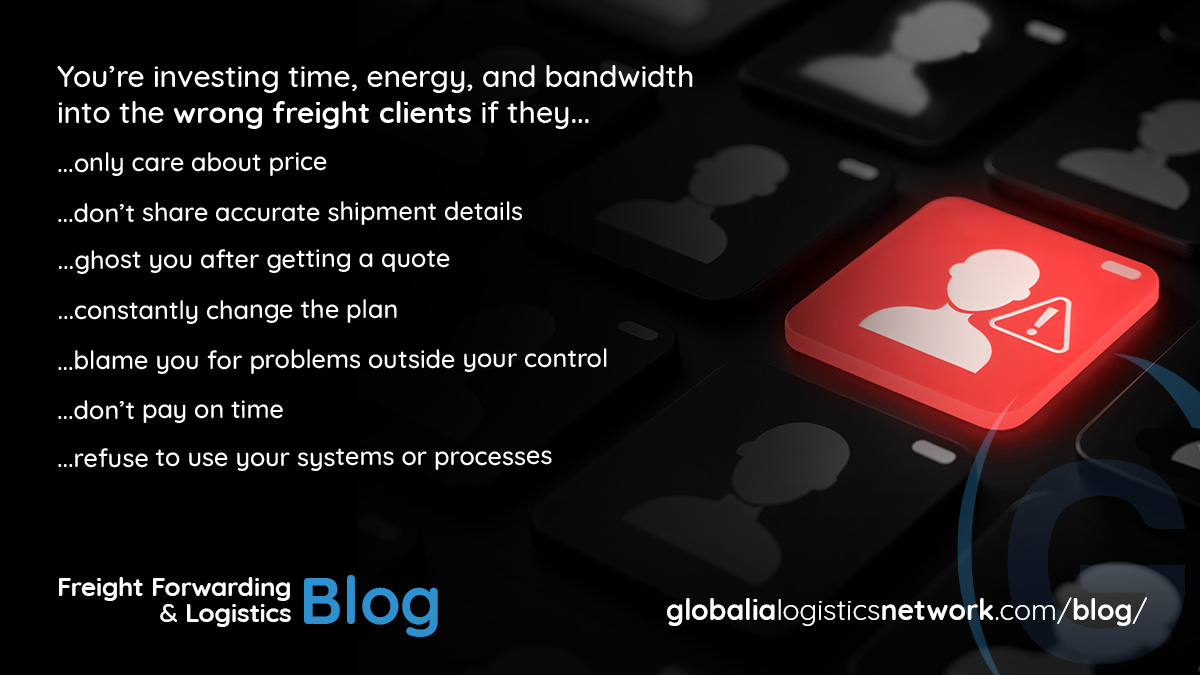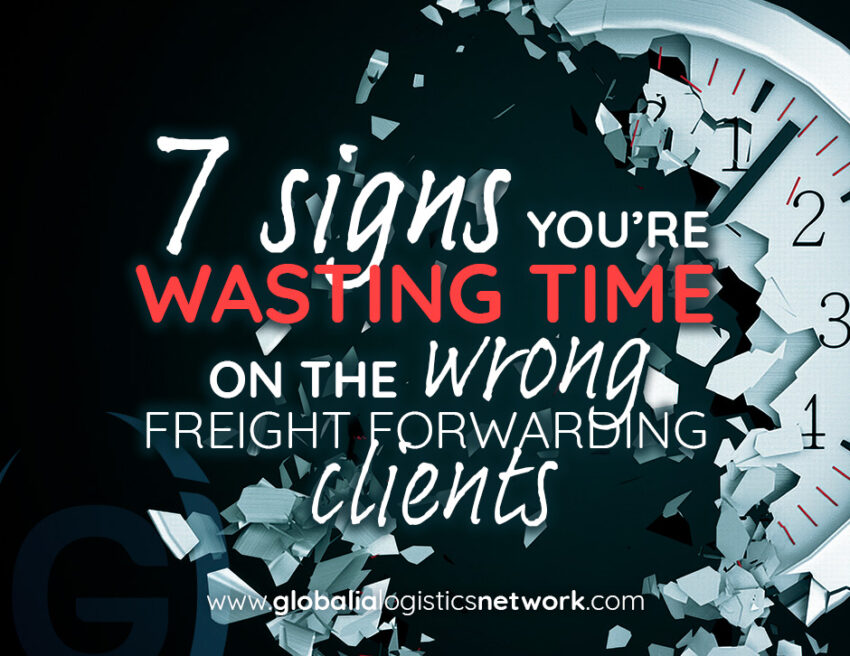If you’re running a freight forwarding company, you already know that not all clients are worth your time. Some drain your resources, stretch your team thin, and never turn into long-term accounts. Worse, they distract you from the clients who actually grow your business. The harsh truth is that a handful of wrong freight forwarding clients can quietly sabotage your operations from the inside.
In today’s blog, we will break down the red flags- seven signs that you’re investing time, energy, and bandwidth into the wrong freight clients and what to do instead.

1. They only care about price
Every logistics company has dealt with them. The client who’s obsessed with rates. Not service. Not reliability. Not transit time. Just cost. They call around asking for the cheapest quote and disappear when you push back on unrealistic expectations. These are not partners. They’re shoppers. And shoppers don’t build loyalty.
If your client can’t see beyond rates, you’ll constantly be competing with the next forwarder who’s willing to undercut you. That’s a race to the bottom. Good clients understand the value of professional service, consistent communication, and problem-solving. They want transparency and performance, not just a number.
2. They don’t share accurate shipment details
Here’s a big one. If you’re chasing clients for basic info such as cargo dimensions, timelines, special handling instructions, you’re setting yourself up for costly errors. Freight forwarding is already a game of precision. One wrong data point can turn a simple job into a full-blown operational mess.
Wrong freight forwarding clients think they’re helping by “keeping it simple,” but what they’re really doing is pushing risk onto your team. You can’t do your job well if you’re operating on guesswork. The best clients understand that information is currency. They know that clear inputs lead to smooth execution, and they respect your need for operational clarity.
3. They ghost you after getting a quote
You spend time crafting a tailored offer. You check transit schedules, assess routing options, and maybe even negotiate with partners to secure a competitive rate. Then silence. The client disappears.
You follow up. Nothing. This isn’t just annoying. It’s a sign that they’re using you as a free quoting engine. No intention to book. No respect for your time.
One solution? Qualify leads before you quote. Ask the right questions up front. Are they the decision-maker? Are they ready to ship? What’s their timeline? You can’t eliminate ghosting entirely, but you can spot the warning signs faster and protect your time.
4. They constantly change the plan
A little flexibility is part of the job. But when a client keeps shifting pickup dates, changing container sizes, or revising documents last minute, it points to poor planning on their end or a lack of respect for your process. This hurts your internal operations. Your team has to rebook carriers, update documents, and realign partners. Every change increases the chance of delay or surcharge, which your client will then complain about. Wrong freight forwarding clients often create their chaos and expect you to clean it up. If the pattern repeats, it’s time to have a tough conversation or walk away.
5. They blame you for problems outside your control
A vessel is delayed due to port congestion. Customs flags a shipment for random inspection. A trucking partner gets caught in a traffic jam. The client calls and demands to know why you failed them. That’s a problem.
Good clients understand that global logistics is unpredictable. They know your role is to manage disruptions, not perform magic. If a client expects perfection in a supply chain full of variables, you’ll never meet their standards, and you’ll end up absorbing emotional fallout for things you didn’t cause. Your job is to control what you can and communicate what you can’t. If the client still doesn’t get it, they’re not a good fit.
6. They don’t pay on time
This one’s straightforward. If you have to chase a client for payment more than once, it’s a red flag. Logistics is a cash-flow-sensitive business. You pay your partners, carriers, and agents upfront. You can’t afford to be the bank for unreliable clients.
Wrong freight forwarding clients will give you every excuse internal delays, payment cycles, new finance team. It doesn’t matter. If they can’t pay on time, they’re putting your business at risk. Set clear payment terms. Stick to them. And if the same client keeps missing deadlines, cut them loose.
7. They refuse to use your systems or processes
You’ve invested in tools to streamline your workflow. Maybe you’re using FreightViewer to send instant quotes and reduce back-and-forth emails. Maybe you’ve automated track-and-trace updates or digitized your document handling.
But some clients insist on doing everything their way. They want manual PDFs, spreadsheets, and separate email threads for each shipment. It’s inefficient, and it slows your entire operation down.
At Globalia Logistics Network, FreightViewer helps members provide instant and professional online quotes, something modern clients actually appreciate. If a customer resists using tools that make the process smoother for both of you, they may not be the right match long-term.
The best logistics clients respect your systems and are willing to collaborate on improving efficiency.
So, what’s the fix?
Spotting the wrong freight forwarding clients is only half the job. The real question is: what are you going to do about it?
Start with qualification. Don’t onboard a new client without knowing their shipping history, payment habits, and expectations. Ask questions early. Be transparent about your process. Set boundaries. And stick to them. Also, communicate your value clearly. Don’t just quote a rate, explain what’s behind it. Walk clients through your service offering. Show them what they’re paying for.
Finally, build a pipeline so you can afford to say no. When you have other leads coming in, you’re not dependent on the wrong clients to pay your bills. That’s where networks like Globalia Logistics Network come in, giving independent freight forwarders access to vetted agents, new business, and digital tools that help them stay competitive.
Final thought
Saying yes to every client is not a strategy. It’s a liability. The wrong freight forwarding clients will consume your time, energy, and resources and never deliver the value your business needs to grow. Be selective. Be clear. And don’t be afraid to walk away. The clients you keep define the company you become.


